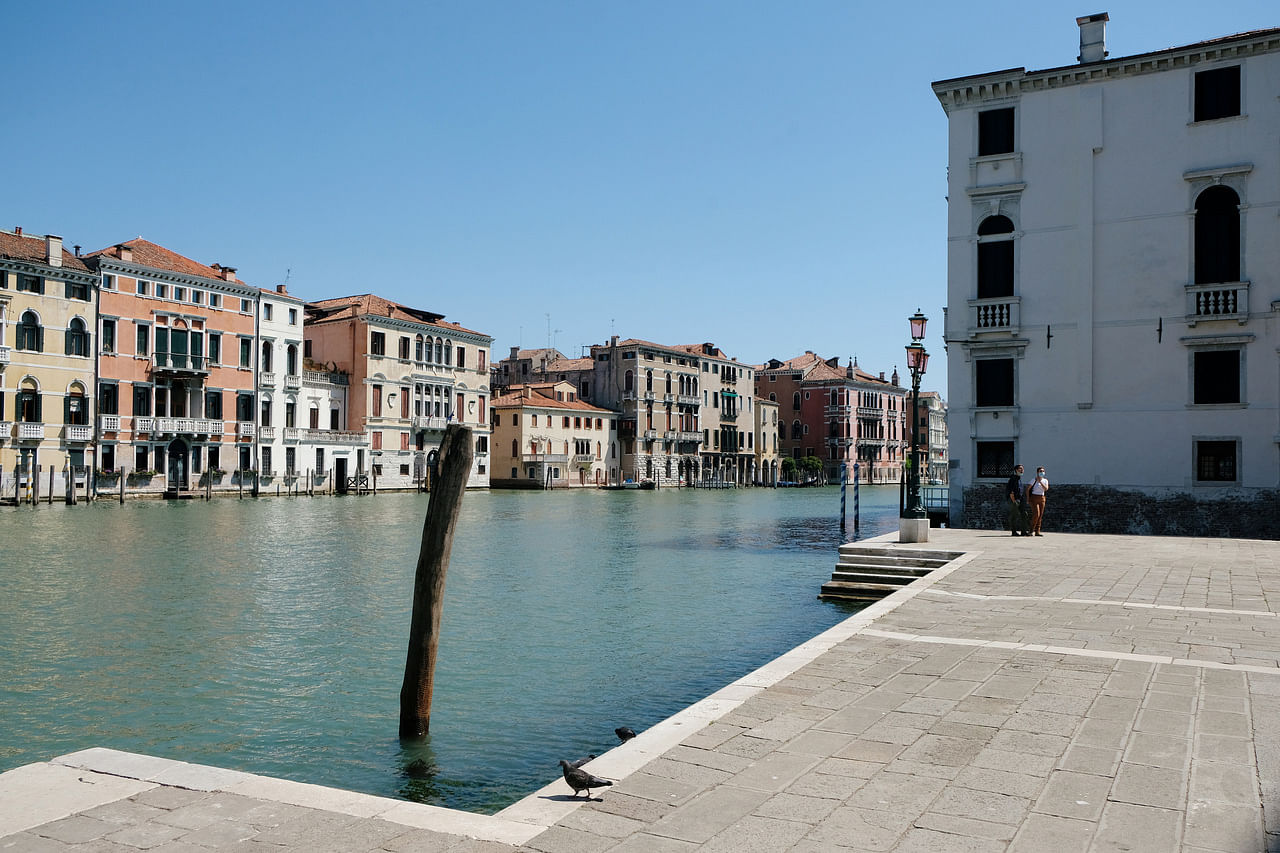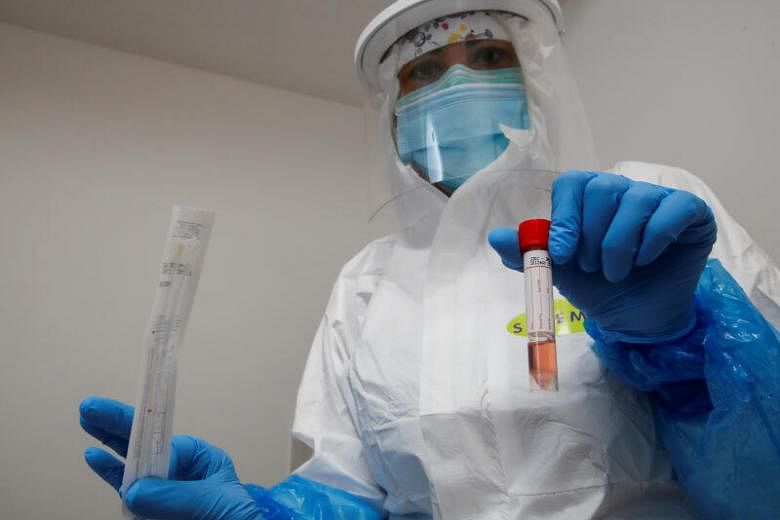LONDON (NYTIMES) - Professor Chris Whitty, Britain's chief medical adviser, stood before an auditorium in a London museum two years ago cataloging deadly epidemics.
From the Black Death of the 14th century to cholera in war-torn Yemen, it was a baleful history.
But Prof Whitty, who had spent most of his career fighting infectious diseases in Africa, was reassuring. Britain, he said, had a special protection.
"Being rich," he explained. Wealth "massively hardens a society against epidemics," he argued, and quality of life - food, housing, water and health care - was more effective than any medicine at stopping the diseases that ravaged the developing world.
His confidence was hardly unique.
As recently as February, when European health ministers met in Brussels to discuss the coronavirus emerging in China, they commended their own health systems and promised to send aid to poor and developing countries.
"Responsibility is incumbent on us, not only for Italy and Europe, but also for the African continent," said Roberto Speranza, Italy's health minister.
"The European Union should be ready for support," agreed Maggie De Block, Belgium's then health minister.
Barely a month later, the continent was overwhelmed.
Instead of merely providing aid to former colonies, Western Europe became an epicentre of the pandemic.
Officials once boastful about their preparedness were frantically trying to secure protective gear and materials for tests, as death rates soared in Britain, France, Spain, Italy and Belgium.
This was not supposed to happen.
The expertise and resources of Western Europe were expected to provide the antidote to viral outbreaks flowing out of poorer regions.
Many European leaders felt so secure after the last pandemic - the 2009 swine flu - that they scaled back stockpiles of equipment and faulted medical experts for overreacting.
But that confidence would prove their undoing.
FALSE ASSUMPTIONS
Their pandemic plans were built on a litany of miscalculations and false assumptions.
European leaders boasted of the superiority of their world-class health systems but had weakened them with a decade of cutbacks.
When Covid-19 arrived, those systems were unable to test widely enough to see the peak coming - or to guarantee the safety of health care workers after it hit.
Accountability mechanisms proved toothless.
Thousands of pages of national pandemic planning turned out to be little more than exercises in bureaucratic busy work.
Officials in some countries barely consulted their plans; in other countries, leaders ignored warnings about how quickly a virus could spread.
European Union checks of each country's readiness had become rituals of self-congratulation.
Mathematical models used to predict pandemic spreads - and to shape government policy - fed a false sense of security.
National stockpiles of medical supplies were revealed to exist mostly on paper, consisting in large part of "just in time" contracts with manufacturers in China.
European planners overlooked the risk that a pandemic, by its global nature, could disrupt those supply chains.
National wealth was powerless against worldwide shortages.
Belgium, by some measures, has the world's highest death rate. Italy's wealthiest region was shattered. France's much-praised health system was reduced to relying on military helicopters to rescue patients from overcrowded hospitals. Britain, though, most embodies Europe's miscalculations because of the country's great pride in its expertise and readiness.

Prime Minister Boris Johnson was so confident that Britain's modelers could forecast the epidemic with precision, records and testimony show, that he delayed locking down the country for days or weeks after most of Europe.
He waited until two weeks after British emergency rooms began to buckle under the strain.
With the number of infections doubling every three days at the time, some scientists now say that locking down a week sooner might have saved 30,000 lives.
Sir David King, a former British chief science officer, said, "The word 'arrogance' comes to mind, I am afraid." He added: "What hubris."
FALSE ALARM
Fear swept the continent. It was spring of 2009 and a new virus that became known as swine flu had infected hundreds and killed dozens in Mexico.
European vacationers swarmed airports to get home. Experts recalled the flu pandemic of 1918, which killed as many as 50 million people around the world.
European governments sprang into action.
France asked the EU to cut off travel to Mexico and began buying doses of vaccine for everyone in the country.
British hospitals enlisted retired health workers and distributed stockpiled masks, gloves and aprons.
Every country in Europe had drawn up and rehearsed its own detailed pandemic plan, often running into the hundreds of pages.
Britain's plans read like the script of a horror movie, if written in the language of a bureaucrat. More than 1.3 million people could be hospitalised and 800,000 could die.
Trying to contain the pandemic "would be a waste of public health resources."
These doomsday scenarios drew on a new subspecialty of epidemiology pioneered by British scientists: using abstruse mathematical models to project the path of a contagious disease.
One early disciple, Neil Ferguson of Imperial College London, had assumed a preeminence in British health policy.
An epidemic of foot-and-mouth disease among livestock in Britain in 2001 was the first time policymakers relied on such modeling while addressing an outbreak.
Over the objections of veterinarians, Mr Ferguson's work guided policymakers to preventively slaughter more than 6 million pigs, sheep and cattle.
Later studies concluded most of the killing was needless.
A review commissioned by the government urged that policymakers "must not rely on the model to make a decision for them."
Yet when swine flu emerged, British leaders again turned to Mr Ferguson and the large modeling department he had built at Imperial College.
He projected that swine flu, in a reasonable worst case, could kill nearly 70,000.
But the modelers' "reasonable worst case" was wildly off.
Swine flu ended up killing fewer than 500 people in Britain, less than in a seasonal flu.
HOLLOWING OUT
Some experts now say Europe learned the wrong lesson from the swine flu.
"It created some kind of complacency," said professor Steven Van Gucht, a virologist involved in the Belgian response. "Oh, a pandemic again? We have a good health system. We can cope with this."
It also coincided with Europe's worst economic slump in decades.
French legislators were furious at the cost of buying millions of doses of vaccines and faulted the government for needlessly stockpiling more than 1.7 billion protective masks.
To cut costs, France, Britain and other governments shifted more of their stockpiles to "just in time" contracts.
Health officials assumed that even in a crisis they could buy what they needed on the international market, typically from China, which manufactures more than half the world's masks.
By the start of 2020, France's supply of masks had fallen by more than 90 per cent, to just 150 million.

On the surface, Europe's defenses still looked robust. EU reviews of each country's pandemic readiness seemed to provide oversight, but the process was misleading.
National governments barred the European Centre for Disease Prevention and Control from setting bench marks or pointing out deficiencies.
So the agency's public remarks were almost unfailingly positive.
But when COVID-19 hit, Belgian officials did not even consult it. "It has never been used," said Dr Emmanuel André, who was drafted to help lead the country's coronavirus response.
In France, President Emmanuel Macron tacitly acknowledged the depletion of the government's stockpile at the beginning of March by requisitioning all the masks in the country. But he still insisted France was ready.
Today, after 44,000 coronavirus deaths in Britain, officials continue to defend their actions.
The government's response "allowed us to protect the vulnerable and ensured that the National Health Service was not overwhelmed even at the virus' peak," a health department spokesman said.
Mr Ferguson said in an interview that the decision not to intervene earlier was made by the government and health officials - not the modelers.
Other scientists say the intensive care reports in early March should have been reason enough to lock down without waiting for more testing or models.
But there is another lesson to learn, said Dr André, who spent years fighting epidemics in Africa before advising Belgium on the coronavirus.
"They keep on telling countries what they should do, very clearly. But all these experts, when it happens in your own countries? There's nothing," he said. "One lesson to learn is humility."











